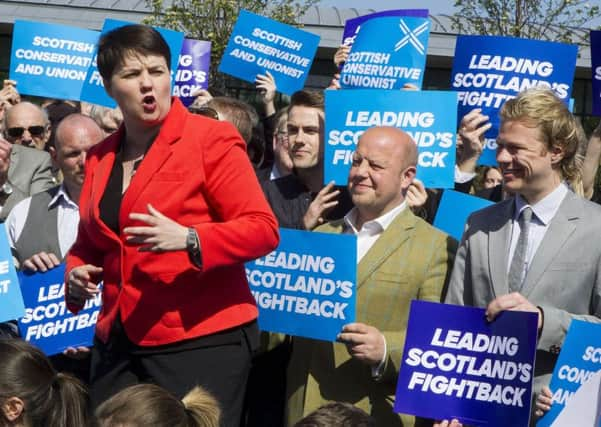Election: Scottish Tories target 15 seats at Westminster


Senior Nationalist figures, including Alex Salmond, Pete Wishart and Angus Robertson, would all lose out to the resurgent Tories, who would take an extra 14 seats and hold the Dumfriesshire, Clydesdale and Tweeddale constituency.
The findings are based on an analysis by the Scottish Conservatives of first preference votes from last week’s council elections, which were revealed yesterday.
Advertisement
Hide AdAdvertisement
Hide AdThe SNP took 32.3 per cent of the vote, which is unchanged from the last council election in 2012 but down from 46.5 per cent of the “first past the post” constituency votes secured by the party in last year’s Holyrood election. The Tories took 25.3 per cent last week – more than double the 12 per cent secured by the party in 2012 and up from 22 per cent in 2016.
Ms Davidson said next month’s poll would be a “two-horse race” between her party and the SNP.
Mr Robertson, the SNP’s Westminster leader, is facing a fight in Moray where the Tories secured 36.1 per cent of first preference votes last week, compared with 31.6 per cent for the SNP.
Former first minister Mr Salmond is also facing a fight for his political survival after the Tories outpolled the SNP in his Gordon seat.
Mr Wishart, who chaired Westminster’s Scottish affairs select committee in the last Parliament, is also at risk after the Tories took 42 per cent in the vote in his Perth and North Perthshire seat in last week’s council elections, compared with just 32 per cent for the SNP.
Labour’s only Scottish MP in the last Parliament, Ian Murray, also looks poised to lose his Edinburgh South seat to the Tories.
But Labour is on course for victory in East Lothian, as well as Lanark and Hamilton East, the council vote shows.
The Liberal Democrats are forecast to win Edinburgh West from the SNP.
Advertisement
Hide AdAdvertisement
Hide AdLaunching her party’s general election campaign in Edinburgh yesterday, Ms Davidson said: “We’re going to be fighting bloody hard in seats that we perhaps haven’t targeted before at a general election. This is absolutely game on. The cliché is a two-horse race, but it really is and we will be leading Scotland’s fightback against the SNP.
“There are a lot of people who are pretty angry actually at the approach that the SNP have taken in the past couple of years.
“Taking nothing away from the tremendous result they had in 2015, they then tried to do that thing where they made out that the SNP was Scotland and Scotland was the SNP.
“It’s not and it’s really got up people’s noses and there’s a real desire particularly from people who voted both Remain and No to stay in the UK. They’re really angry at Nicola Sturgeon for trying to assimilate their vote for Remain as a proxy vote for independence when it was nothing of the sort.”
She insisted that the majority of Scots are opposed to independence despite the recent vote by MSPs calling for a second referendum, when the SNP and Greens combined.
“The strength of feeling that’s out there in this election is so much stronger than I’ve come across at previous elections,” she added.
“This has the possibility to reshape not just the electoral map of Scotland but the politics of Scotland and the framework of the questions of constitution in Scotland in this general election. It’s that important.”
Mr Wishart was joined on the campaign trail in Perth by First Minister Nicola Sturgeon yesterday, who said she is “very confident” he will be re-elected.
Advertisement
Hide AdAdvertisement
Hide AdMs Sturgeon said the general election in Scotland will be “straightforward choice” between the SNP or Conservative MPs who will “rubber-stamp” Prime Minster Theresa May’s hard Brexit and austerity policies. She claimed the council election results are a “huge springboard for the SNP going into this election”.
Ms Sturgeon said: “The issue at the heart of this election, not just in Perth and Perthshire but across Scotland, is a very straightforward one.
“Tory MPs from Scotland will be a rubber-stamp for Theresa May, for her reckless approach to Brexit and the cuts we know the Tories will want to impose.
“SNP MPs like Pete Wishart will be MPs that go to Westminster to stand up for Scotland, make Scotland’s voice heard and protect Scotland’s interests.
“For the next few years, perhaps more than ever before, Scotland needs strong voices to stand up and make our voice heard.
“We know from the polls in England that Theresa May is going to win this election, the question is who is going to stand up and make Scotland’s voice heard?”
The First Minister insisted 8 June is the chance to put “Scotland’s in Scotland’s hands” and not those of Mrs May.
“The fact is you cannot trust the Tories — they’re cutting Scotland’s budget as it stands and gearing up to inflict more austerity and further hardship in the years ahead,” Ms Sturgeon added.
Advertisement
Hide AdAdvertisement
Hide Ad“The Tories want to deprive young people of opportunities, they want to hammer working families and they want to put more of a burden on households with punitive policies like the Bedroom Tax and Rape Clause. And now the Tories have older people in their sights too — as they gear up to end the pensions triple lock.
“Scotland must speak with a clear voice in this election to stop the Tories in their tracks.”
The Scottish Conservatives made their own projections for the number of seats each party will win next month by taking the council results from individual wards which make up each Westminster constituency in Scotland.
However, council elections include about 11 per cent of independents which limits their scope to indicate the likely general election result. Turnout will also be higher next month, although the 46.9 per cent turnout last week was higher than normal for council votes.
